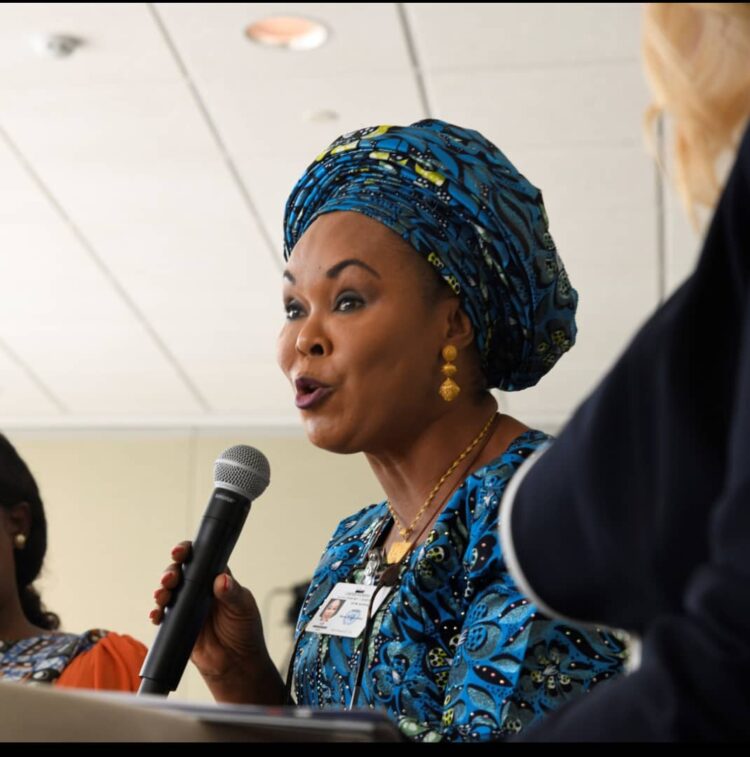Pursuant to renewed efforts towards addressing the plight of Nigerian women and girls, the Federal Government has re-emphasized its commitment to end child marriage and other gender based violence through the use of data and accelerated action, in partial fulfillment of the Sustained Developed Goal (SDG) 5.3 which aims to eliminate harmful practices against women and girls.
This formed part of presentation by the Honorable Minister of Women Affairs, Barr Uju Ohanenye during a high level event convened by the governments of Canada and Zambia in conjunction with the United Nations Population Fund (UNFPA) and United Nations International Children’s Emergency Fund (UNICEF) as part of activities marking the 2023 United Nations General Assembly, taking place in New York, United States of America.
Re-affirming the Federal Government’s position on this harmful practice against women and girls, Barr Uju stated that “child marriage is a pervasive issue affecting millions of girls globally with serious health issues such as Vesico-Vaginal fistula (VVF)” and highlighted the need for continued international support in addressing these challenges.
She however disclosed Nigeria’s commitment to ending child marriage and promoting gender equality by highlighting Nigeria’s status as a signatory to international agreements such as the Convention on the Elimination of All Forms of Discrimination Against Women (CEDAW) and Girls; African Charter on the Rights and Welfare of the Child; United Nation Convention on the Rights of the Child and National Strategy to End Child Marriage and Gender-Based Violence policies with the assistance of the UNICEF to review these strategies.
Barr Uju also harped on recent legal reforms aimed at addressing child marriage in Nigeria which includes Child Rights Act (CRA) which was passed in 2003 and domesticated in 35 states and FCT adding that amendment is ongoing by the National Assembly to push for stiffer penalties under the Child Rights among other legal reforms.
According to her “ we are reviewing and updating the national strategy to end child marriage for it to end between 2023 and 2030 but I believe if we change the strategy to suit the Nigerian context, it will make huge impact on the less privileged people” she said.
The Minister also outlined other coordinated strategies towards addressing the issue of child marriage such as the support of the Attorney-General of the Federation, use of traditional rulers to scale up social mobilization, whistle blowers and Mobile Courts to ensure quick dispensation of justice on matters relating to sexual and gender based violence in Nigeria, in addition to the introduction of Cooperatives to upgrade the status of Women groups in the communities to be enterprising and self- reliant.
Responding, the Honourable Minister of Community Development and Social Services of Gambia, Mrs Doreen Mwamba advocated for a multi-sectoral plan which will effectively contribute to improve investment and accountability to end harmful practices against children across different sectors and actors including within education, health, justice and child protection with particular emphasis to end child marriage. She emphasised that the method worked for them in Gambia and reduced the prevalence of Child Marriage due to the unique and complementary strengths of support from UNFPA and UNICEF.
Furthermore, the Assistant Minister of Domestic Affairs Canada, Hon. Peter MacDougall supported the position of both the Ministers of Women Affairs Nigeria and that of Gambia on the same issues on how to tackle the problem of early child Marriage. They further emphasized the need to amplify the voices of girls regarding the difficulties encountered under situation of child Marriage.
In her own submission, the Honourable Minister of Homes Affairs of the Republic of Serbia, Hon. Darija Kisic concluded the remarks from the high level meeting by supporting the Global program of multi-sectoral approaches to end child marriage and also emphasized that “by investing in quality data, research and knowledge management as well as technical guidance and capacity building, the Global Program helps build a strong evidence base for advocacy, policymaking and programming to end child marriage, benefiting countries beyond the main targeted high prevalent countries of child marriage in the World” she concluded.
The high level meeting also had in attendance, the Director-General, Social Development Bureau, Global Affairs Canada, Ms. Sharon Armstrong, Director of Education, Gender and Equalities at FCIDO and the UK Special Envoyfor Gender Equality, Ms. Alicia Herbert, Chief of Staff, Office of the Global Women’s Issues, United States Department of State, Ms. Varina Winder and the Senior Adviser of Data, Analytics, Planning and Monitoring, Ms. Claudia Cappa among other global stakeholders.















